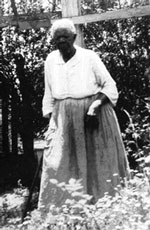
(FinalCall.com) – As members of the reparations movement forge ahead to achieve operational unity, local organizing efforts in Houston have provided an informative example of this principle in practice.
About 20 organizations formed a coalition last April to plan actions that would culminate at the Millions for Reparations rally held October 2002. These groups included the National Black United Front (NBUF), the Black United Fund of Texas, the Nation of Islam, Grace Temple Missionary Church, the New Black Panther Party and S.H.A.P.E. (Self Help for Afrikan People through Education).
Patterned after the local organizing committees (LOCs) that mobilized for the Million Man March, the coalition has adapted some of the lessons learned from the LOCs in their formation of the Local Action Committee (LAC) on Reparations, says Kofi Taharka, the coalition’s coordinator, who is also the chairman of the Houston chapter of the National Black United Front.
“We are not trying to create another organization,” he explained. “We encourage people from other groups to come to the meeting. Structurally, that’s how we’ve been able to keep it alive and not have people just burn out. If you’re getting groups together, these people are running organizations themselves and they have their own agenda. So, we try to make it as simple as possible for them to stay connected.”

Along with their simple approach, the coalition makes their work towards reparations relevant, by incorporating local issues into their initiatives. For instance, the Reparations LAC is currently working on an action protest of the gentrification that threatens an area that holds great significance to Black people in the city, Freedman’s Town. Often overlooked and somewhat hidden, the neighborhood is located near downtown and includes a cemetery atop a hill enclosed by a wrought iron fence. Inside the closure, about 400 unnamed slaves were interned in graves marked with numbers.
“The gentrification in that community, we feel, bolsters our claim and demand for reparations,” Mr. Taharka told The Final Call. “You have this field sitting out here that nobody even knows who is buried. But it’s not just the politicians’ responsibility; it is the people’s responsibility to be the cherisher of their history and culture.”
Firmly rooted in action, the group has successfully launched numerous grassroots actions, which include community forums and debates; marches and protests in front of governmental, religious and corporate institutions that have presented blocks to progress; and the dissemination of educational leaflets that provide answers to frequently asked questions along with visual illustrations to reinforce the call for reparations.
Coalition members also conducted research into the Imperial sugar company based in the city and discovered that it has strong ties to the trans-Atlantic slave trade. Although a city council vote defeated a resolution that supported Congressman John Conyers’ reparations study bill H.R. 40, the media craze that surrounded the hearings actually helped the cause, the activist maintained, because it raised the awareness levels of the public, more so than if the resolution had been passed quickly and quietly in the council. These grassroots activities have given the LAC valuable lessons about the practical side of unity in the reparations movement.
“To have unity means to share the spotlight. No “Big Six” move on the reparations movement. There’s a fine line between trying to have unity and protecting the integrity of a movement,” Mr. Taharka said.
“Movements are defined by actions. That’s one of the things that fuels people’s interests and educates them. For reparations to become a bonefied movement, our actions have to speak louder than the words and conferences,” he concluded.
(For more information about involvement in the organizing efforts in Houston, email [email protected] or call (713) 942-0365.)












